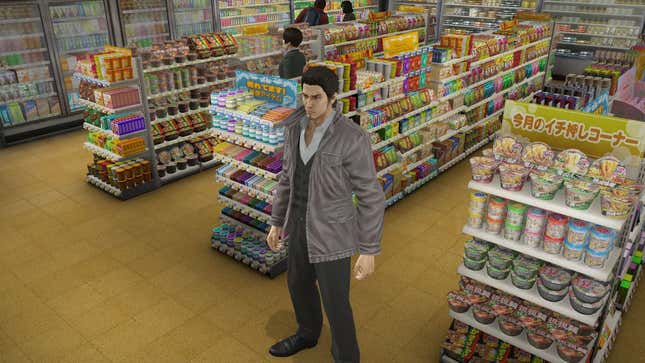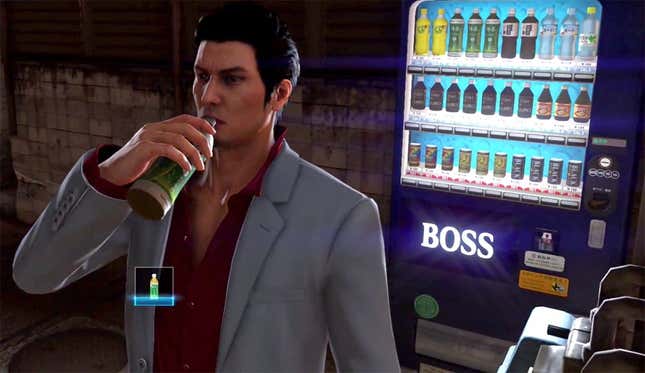
Go look through your Steam Library, flick across the spines of your PlayStation collection or gaze up at the shelf with all your Xbox games on it and tally for yourself: how many games are there set in the world you live in?
I’m not talking about Call of Duty, which puts dates and names on contemporary places but could be set anywhere. I’m not talking about a racing or sports game, which intricately model exactly one aspect of the entire human experience, at the expense of infinitely countless others.
I’m talking about a video game that lets you do a lot of the stuff you already do, or at least can do, on a daily basis. After you’re done adding those games up, you probably won’t find many. You might not find any at all.
Let me explain where I’m going with this. I was playing Yakuza Kiwami 2 the other day, part of a long-running series that is believed to be inherently Japanese, when I realised one of the things that resonated most with me wasn’t very Japanese at all.
Yakuza is inherently urban. Most of your time spent interacting with a Yakuza game isn’t spent smashing bikes into a man’s face, it’s spent approximating the same stuff anyone who lives and/or works in a modern urban environment does every day. You’re just...walking around. Popping into a convenience store to buy a drink. Trying out the new fast food place on the corner (every new Yakuza game, set 1-2 years after the last, always has a new place to try). Catching a cab because it’s raining and you can’t be bothered walking four blocks. Running into people you know on the street (or not running into them, see previous cab comment).
These are global, human experiences because they’re built around one of the few things billions of people around the world have in common: consumer capitalism. Yakuza is set in Japan but the bulk of its action—ritual and ancient combat on the grounds of a hallowed clan headquarters aside, maybe—could be taking place anywhere and it would be much the same game. Anywhere people live, eat and shop within close proximity, from Manila to Melbourne, Brussels to Bangkok would work just as well.
A big part of Yakuza’s appeal is the intimacy of its place, the availability of so much stuff in such a relatively small area, the way you start to recognise certain buildings, know your way around back alleys. The fact almost everywhere you visit is a store—a bar, a takeout, a restaurant, a clothing retailer—is, on the one hand, kinda depressing! That so much of our love for Kamurocho is built on commerce, and that I dismissed other genres above for only doing one thing when Yakuza is, when you strip it down to the studs, spending most of its time also doing just one thing (buying stuff).
On the other hand that’s a gross simplification, because it’s not our fault the world is like this, we’re just living in it. And buying a refreshing soda from a vending machine, going to the arcade, buying a new bandana or sitting down to enjoy a nice meal might all be “commerce” in the broadest sense of the world, but they’re also very different types of nice things, satisfying very different needs and urges.
Importantly, what sets these Yakuza activities apart from other “real world” games like Madden or Gran Turismo or Life is Strange is that fact that they’re everyday things. We do them, all the time, just like the guy on screen. Which sounds boring as hell, but is in fact I think one of the biggest reasons people love Yakuza, and its main playable characters, so damn much.

Kazuma Kiryu is an exceptional man, of course, who can hurl signs into crowds of armed men, leap over barricades like Superman and even cheat death. But he’s also the most relatable protagonist in video games, because when he’s not doing that stuff we’re in control of him as he sits down to slurp a bowl of ramen, buy a packet of smokes or get weirdly frustrated at a UFO catcher machine.
I do that! We do that! And having the player control Kiryu’s most mundane activities—playing out in a world that’s a recreation of our own, not a fantasy or alternate timeline or fictional take—is the best, because they’re doing a wonderful job of fleshing the character out. Making him fallible, human, a guy who has to kill time and run errands and eat normal food, just like us.
This revelation got me thinking about two things. Firstly, about how if you could move the Yakuza formula to another city, I’d love to see a London edition/take, complete with Greggs, pints, nice suits and the city’s iconic cabs. The characters and cutscenes would write themselves:
Secondly, it was weird that I was having to fantasise about a different game doing this, since almost no other video game series is letting us do everyday things in a digital version of our own world. There are open world games (Yakuza is definitely not an open world game) with some stores and pastimes, sure, but they’re not as integral to the experience, or as densely-packed. They’re also often caricatures of cities (see: GTA V), with little resemblance to Yakuza’s faithful recreations of a modern urban environments, down to the magazine racks on convenience store shelves. And games like Animal Crossing and Stardew Valley may encourage players to engage in the mundane, but they’re set in idyllic locations, and digging up turnips is not something people living in modern cities are doing every day.
Persona, maybe? Though it provides the illusion of freedom and choice, in reality its hamstrung by a limited set of locations and a strict schedule it keeps the player on. So no. Sleeping Dogs? It has some denser areas, designed to be played as a pedestrian, but still nothing on the scale of Yakuza’s daily distractions. The Sims? It’s either the best or worst example possible, and would need a whole other article to unpack, so in the interests of keeping this brief I’m going to say “no” here as well (though I will entertain arguments to the counter!)
I guess all I want to say here is that video games don’t always have to be about escapism. Or at least don’t always have to be about escapism. Sometimes the most boring, everyday actions can be the most meaningful in a game, because if you want us to truly relate to a playable character, one of the best ways to do that isn’t to pull off some superhuman shit every five minutes, but to just...let us take them out for a nice little snack and a walk down the street.

